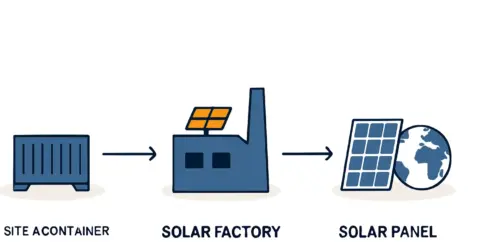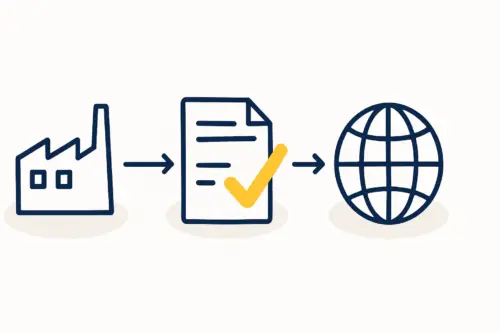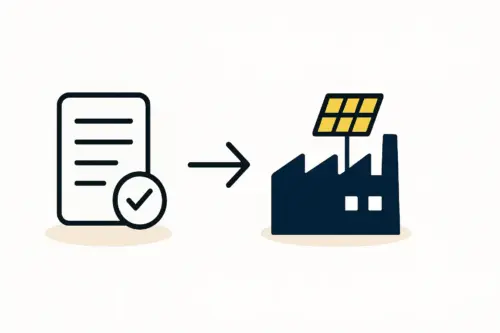A state-of-the-art solar module production line stands ready for operation. The machinery is calibrated, the staff is trained, and the building meets every specification. Yet, the facility remains idle. A critical shipment of silicon wafers is delayed at the port, and the locally sourced packaging materials have just failed a quality inspection.
This scenario, common in new industrial ventures, highlights a fundamental truth: a solar factory is only as strong as its supply chain. For entrepreneurs establishing a solar module factory in Benin, managing logistics—both international and local—is as crucial as the production technology itself. This article outlines the primary challenges and strategic opportunities in building a resilient and efficient supply chain, from the Port of Cotonou to your factory floor.
Table of Contents
The Dual Challenge: International Imports and Local Sourcing
A solar module assembly operation relies on a hybrid supply chain. High-tech core components must be imported, while other auxiliary materials and services can, and should, be sourced locally.
International Inbound Logistics: This stream includes the critical, high-value components that form the heart of a solar module. They are typically sourced from established global suppliers in Asia, Europe, or North America.
- Silicon Solar Cells
- Tempered Solar Glass
- EVA (Ethylene Vinyl Acetate) Encapsulant Film
- Backsheets (TPT, TPE) or a second pane of glass
- Junction Boxes with Diodes and Cables
Local and Regional Sourcing: This category covers materials and services required to support production, packaging, and day-to-day operations. Sourcing them locally can significantly reduce costs, shorten lead times, and build goodwill within the community.
- Aluminum Frames
- Packaging Materials (wooden crates, cardboard, corner protectors)
- Operational Services (inland transport, security, maintenance)
Successfully balancing these two streams is key to operational efficiency and cost control.
Navigating International Logistics to Benin
The journey of your core components begins thousands of kilometers away and culminates at your factory gate. The final leg of this journey—arrival and processing in Benin—is the most critical.
The Port of Cotonou: Gateway and Bottleneck
The Autonomous Port of Cotonou is the primary maritime gateway for Benin and several landlocked neighbors. While it is a strategic asset, new investors must be aware of its operational realities.

The port is undergoing significant modernization to increase capacity and efficiency. However, entrepreneurs should plan for potential challenges that can impact project timelines and costs:
- Congestion: High traffic volumes can lead to delays in berthing and unloading vessels.
- Customs Clearance: Navigating customs can be complex and time-consuming. Inaccurate paperwork or unexpected inspections can halt a shipment for days or even weeks. Experience from J.v.G. turnkey projects in similar markets shows that underestimating the time and capital required for customs is a common and costly planning error.
- Handling and Storage: Ensuring that your sensitive materials, like fragile silicon wafers, are handled correctly and stored securely is paramount.
Engaging a reputable, experienced local freight forwarding and customs clearance agent is not an optional expense; it is a critical investment in de-risking your supply chain. Their expertise can be the difference between a smooth process and a costly delay. The quality of port access is a key factor in the overall viability of your chosen site, a topic covered in more detail in our guide to Infrastructure Requirements for a Solar Factory in Benin Infrastructure Requirements for a Solar Factory in Benin.
The “Last Mile”: Inland Transportation
Once your container is released from the port, it must travel to your factory. This “last mile” journey, which could span hundreds of kilometers, presents its own logistical hurdles.

Road networks, including the vital Abidjan-Lagos corridor, are improving but can still be unpredictable. When planning, consider:
- Road Conditions: Poorly maintained roads can increase transit times and the risk of damage to sensitive cargo.
- Security: High-value shipments require adequate security measures during transit.
- Vehicle Availability: Access to reliable, suitable trucks for container transport may be limited, especially during peak seasons.
These factors must be built into your inventory management strategy. Holding a buffer stock of critical components can prevent a production shutdown caused by a simple transport delay.
The Opportunity in Local Sourcing
While importing core components is a necessity, developing a local supply base for auxiliary materials is a major strategic opportunity. This approach reduces dependence on international logistics and contributes directly to the local economy.

Potential areas for local sourcing in Benin include:
- Aluminum Frames: If a local aluminum extrusion facility exists or can be developed, sourcing frames locally eliminates the cost and complexity of shipping bulky items. This requires rigorous quality control to ensure precise dimensions and proper anodization.
- Packaging Materials: Wooden crates, pallets, and cardboard protectors are ideal candidates for local procurement, supporting local carpenters and workshops.
- Services: A wide range of essential services—from inland logistics and warehouse management to site security and equipment maintenance—should be sourced from local providers.
The benefits extend beyond cost. Shorter lead times for these items provide greater operational flexibility. This approach is a core element of managing your operational Labor and Supply Chains for Solar Manufacturing in Benin Labor and Supply Chains for Solar Manufacturing in Benin.
However, a structured supplier qualification process is essential. It involves vetting potential suppliers for quality, reliability, and capacity before signing any contracts.
Frequently Asked Questions (FAQ)
What are the main materials I will need to import for a solar module factory?
You will need to import all core components from your bill of materials (BOM). This includes silicon cells, solar glass, encapsulant films (EVA), backsheets, and junction boxes. These specialized materials are not manufactured in Benin and must be sourced from established global suppliers.
How long does it typically take for goods to clear customs in Benin?
While clearance can take just a few days with perfect documentation and an experienced agent, it is prudent to budget for one to three weeks. This buffer accounts for potential administrative delays, physical inspections, or port congestion.
Is it always more cost-effective to source materials locally?
Not necessarily. The “landed cost” is the key metric. You must compare an imported item’s price plus shipping, insurance, and duties against a local item’s price plus the cost of quality assurance. Sometimes, the reliability and quality of an imported product can outweigh the higher price. For bulky items like packaging, however, local sourcing is almost always more economical.
What kind of local partner is most important for logistics?
An experienced and trustworthy customs clearance and freight forwarding agent is arguably your most critical local partner. Their ability to navigate port and customs bureaucracy efficiently will have a direct, significant impact on your project’s timeline and budget.
How does infrastructure impact production planning?
Unreliable transport infrastructure requires holding higher levels of inventory (“buffer stock”) at your factory. If a shipment might take an extra week to arrive from the port, you must have enough materials on-site to continue production. This ties up working capital but is essential insurance against line stoppages. Planning for these realities is a cornerstone of the process outlined in [How to Start a Solar Module Factory]([Link to: How to Start a Solar Module Factory]).
Next Steps: Building a Resilient Plan
Logistics and supply chain management are not secondary tasks to consider after the factory is built; they are foundational pillars of your business plan. A successful solar manufacturing venture in Benin will be built on a hybrid supply chain that masterfully manages global imports while strategically developing local partnerships.
By anticipating challenges at the port, planning for the realities of inland transport, and actively seeking local opportunities, you can build a robust operation that is both cost-effective and resilient.






